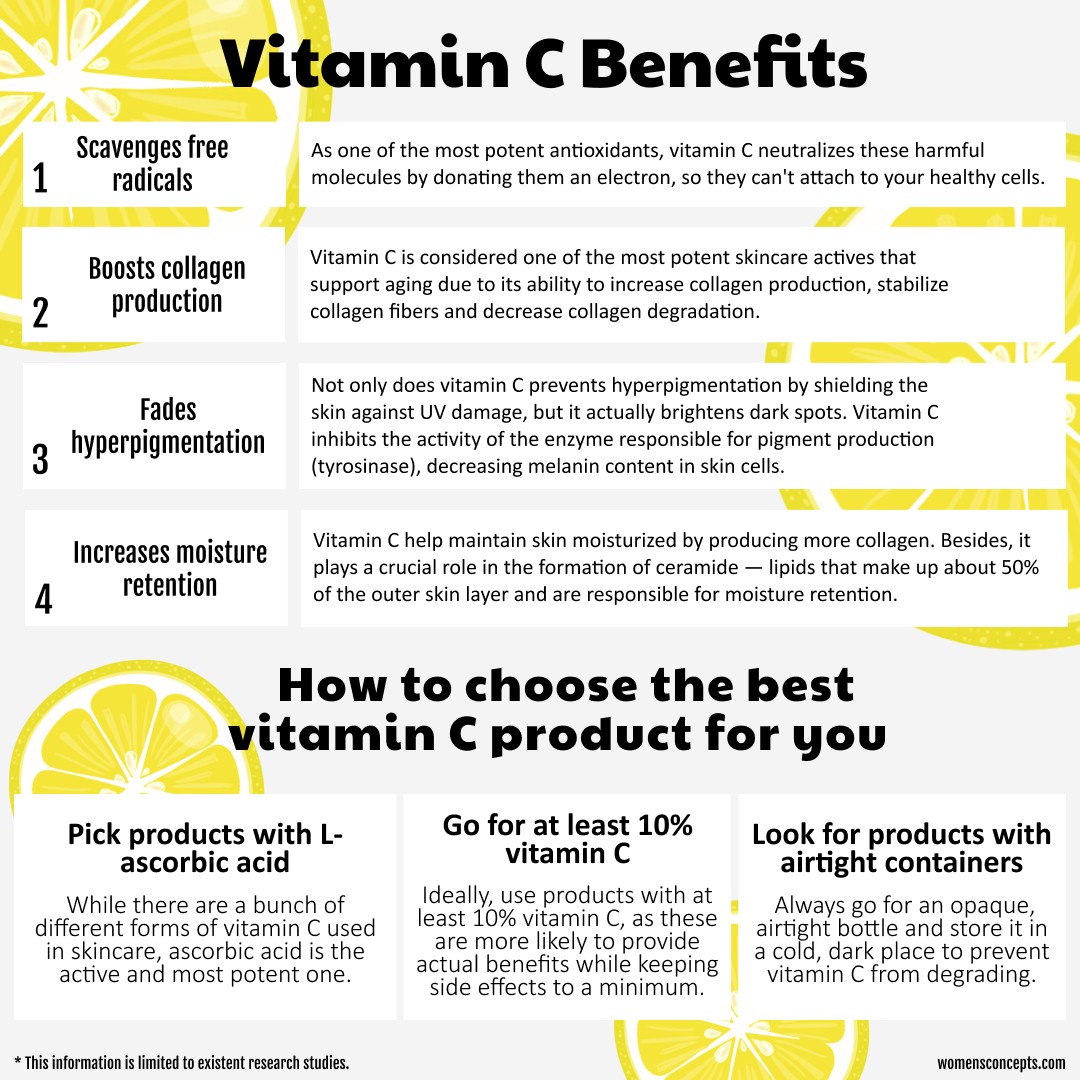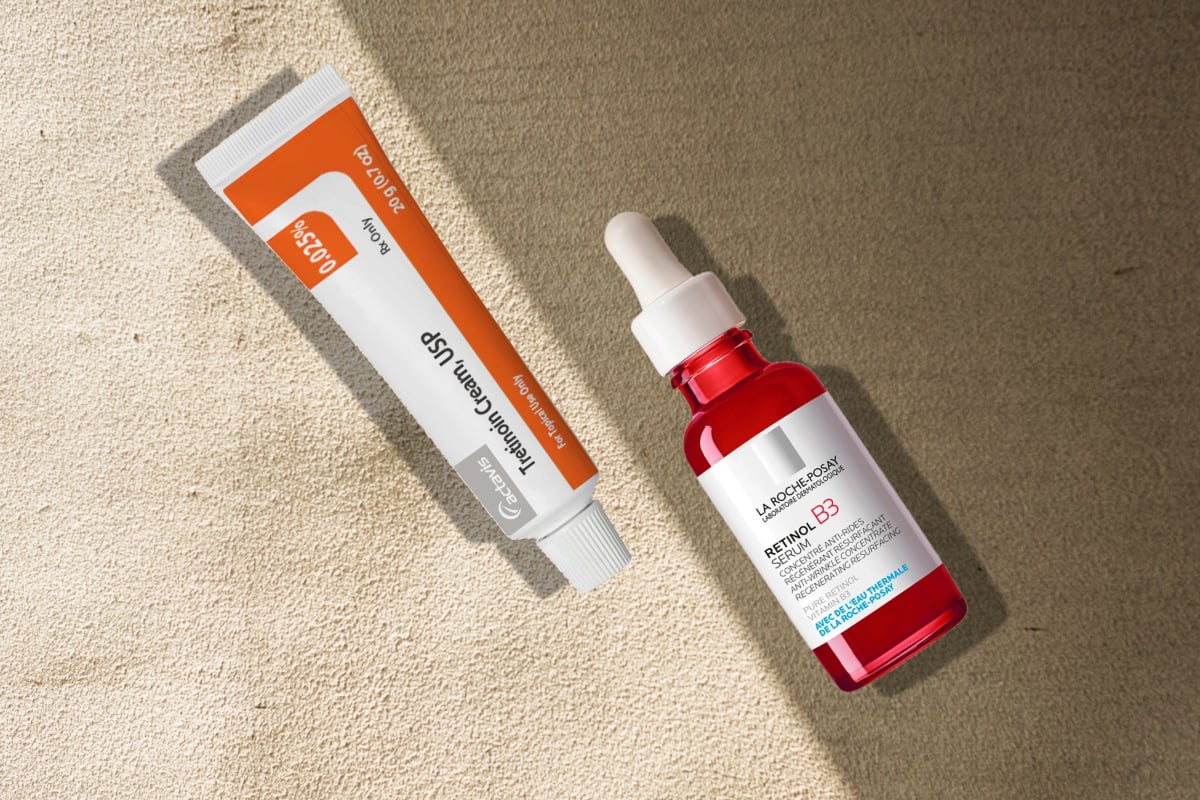Vitamin C is the show-off we can’t get enough of due to its ability to tackle multiple skin concerns at once. From delivering the best-in-class antioxidant protection to boosting collagen, brightening dark spots, and increasing moisture retention, vitamin C does it all, which is why it became a mainstay in any beauty routine, whether you’re a skincare obsessive or a moisturize-and-go type of person. Yes, this ingredient reigns supreme in the skincare world, and in this post, you’ll see why. Here we’ll take you through all the benefits of vitamin C for the skin, how to use it, with what ingredients you should pair it to boost the results, and also uncover some of the not-so-glowing facts about it.
What is vitamin C?
Vitamin C (or ascorbic acid) is a water-soluble vitamin that the body uses to regulate cell growth and repair. Since vitamin C dissolves in water, the body can’t store it well, which is why you should take it daily from foods, supplements, or skincare products.[1] Also, the human body can’t synthesize vitamin C, so it should be taken from other sources.

The skincare benefits of vitamin C
Even though vitamin C is mostly known for its ability to neutralize free radicals, it can bring numerous other benefits when topically applied. Here is what vitamin C does to your skin when used consistently:
Scavenges free radicals
The main role of vitamin C is to neutralize free radicals and stop them from damaging the skin cells. Free radicals (from sources like UV, pollution, and smoke) are the primary cause of premature skin aging, they weaken collagen and elastin fibers and can lead to dark spots, dullness, and even skin cancer. As one of the most potent antioxidants in skincare, vitamin C neutralizes these harmful molecules by donating them an electron, so they can’t attach to your healthy cells.[2]
Interestingly, vitamin C provides better photoprotection when fused with vitamin E.[3] Better still, research reveals that ferulic acid combined with these two vitamins doubles the protection against UV damage.[4]
Boosts collagen production
Vitamin C is considered one of the most potent skincare actives that support aging due to its ability to increase collagen production, stabilize collagen fibers and decrease collagen degradation.[5] As the most abundant protein in the body, collagen gives skin structure and strength. However, with aging and other external factors (like UV exposure), collagen levels deplete, leading to wrinkles and loss of firmness and elasticity.
As an essential compound that spurs collagen growth, vitamin C is ideal in your beauty ritual whether you want to prevent early wrinkles, correct aging signs, or speed up wound healing — since more collagen provides a better framework for cell repair.
Fades hyperpigmentation
Not only does vitamin C prevents hyperpigmentation by shielding the skin against UV damage, but it actually brightens dark spots. Vitamin C inhibits the activity of the enzyme responsible for pigment production (tyrosinase), decreasing melanin content in skin cells. Studies indicate that vitamin C has higher brightening effects when combined with other depigmenting agents, such as soy extract and licorice.[2]
Increases moisture retention
A weakened epidermal barrier, aging, or sun damage are all culprits that lead to hydration loss. Well, vitamin C helps maintain skin moisturized by producing more collagen. Besides, vitamin C was also shown to play a crucial role in the formation of ceramide — lipids that make up about 50% of the outer skin layer and are responsible for moisture retention.[6] This means that products with a meaningful concentration of vitamin C not only reduce moisture loss but promote a hydrated and supple complexion.
Reduces redness and swelling
Due to its antioxidant, anti-inflammatory, and barrier-strengthening activities, vitamin C minimizes redness, eases swelling, and calms the skin. For this reason, vitamin C is a must during winter when the complexion is prone to redness and reactions.
Tackles acne
Inflammation and oxidative stress might set the stage for all subsequent pathogenic factors leading to acne.[7] As an anti-inflammatory and antioxidant agent, vitamin C solves both problems by easing swelling and preventing the oxidation of sebum, which in turn reduces the chances of bacteria thriving in the pores and minimizes pimples. In a clinical trial, the application of 5% sodium ascorbyl phosphate (a stable form of vitamin C) for 12 weeks considerably reduced acne lesions.[8]
Who can use vitamin C?
Everybody can use vitamin C, though people with sensitive skin should be mindful of the concentration used. In order to be stable, vitamin C needs to be formulated at a low pH level, which may be too acidic and cause irritation in people with sensitive complexions.
Is vitamin C safe?
Vitamin C is generally safe for most people. However, there might be cases when vitamin C may induce redness or sensitivities, especially on easily reactive and sun-damaged skin. If that’s your case, consider using a low-concentrated product and increase concentration as your skin builds tolerance. Ideally, start with 10% vitamin C, then gradually increase the concentration to 15% and 20%.
Oral vs. topical vitamin C
As far as skincare is concerned, both oral and topical use of vitamin C deliver tremendous benefits. However, to get the most out of it, it’s best to apply vitamin C topically. While topical vitamin C is well established to hike up collagen levels, minimize wrinkles, brighten dark spots and reduce environmental damage, taking vitamin C orally has mostly been researched in the dermatological field for increasing collagen and lipids production.
Another reason topical application takes the upper hand is that when vitamin C is taken from foods or supplements, only a small amount reaches the skin, unlike when it’s directly applied to the complexion.[5] Still, topical vitamin C comes with a few drawbacks, too: it’s poorly absorbed into the skin and degrades quickly when exposed to light and air. But most modern products come with delivery systems to increase vitamin C’s penetration power and are packed in amber bottles to reduce degradation risk.
Is vitamin C good for the eye area?
Yes, as long as the product is formulated to be used on the eye area. As a matter of fact, vitamin C is one of the best ingredients to have in your eye cream as it offers antioxidant protection, boosts collagen, brightens dark circles, and increases hydration.
How to use vitamin C
A serum is the best way to add vitamin C to your beauty routine. Due to their watery consistencies, serums have tiny molecules and shoot actives right into the skin, unlike moisturizers that sit on the surface. Besides, serums have higher concentrations of actives, so they are more likely to trigger changes in the skin. Ideally, use your vitamin C serum every morning after cleansing and before sunscreen.
What concentration of vitamin C to use in skincare products
Identifying the right concentration for your skin is essential to get the most out of your vitamin C product. If you are a vitamin C beginner, start with as low as 10% and slowly go up to 15% and subsequently to 20% vitamin C as your skin gets accommodated with it.
What to pair vitamin C with
Vitamin C pairs well with other antioxidants, especially with vitamin E and ferulic acid, and according to studies, it can double the antioxidant protection when these three are used together. Other than that, vitamin C teams up nicely with hydrating and replenishing ingredients like hyaluronic acid, ceramides, peptides, niacinamide, and squalane.
On the other hand, you should avoid mixing vitamin C with high concentrations of retinol and glycolic acid. The thing is, using vitamin C and retinol together can render each one ineffective since the former needs to be formulated at an acidic pH and the latter at an alkaline pH. The best approach is to use them at different times of the day — vitamin C in the morning and retinol at night.
Regarding vitamin C and glycolic acid, both are very acidic and can irritate the skin if used at the same time. Also, avoid using vitamin C with benzoyl peroxide, as the latter can render vitamin C ineffective by destabilizing and oxidizing it. P.S.: Our skincare dictionary is a great place to keep an eye on all skincare ingredients and learn how to mix them.
How to choose the best vitamin C product for you
There are a few rules you should consider before shopping for a new vitamin C product if you want to leverage your skincare purchases.
Look for products with airtight containers
As an antioxidant, vitamin C is prone to oxidation and degradation every time it comes in contact with our daily environment, aka light and air. When shopping for a vitamin C product, always go for an opaque, airtight bottle and store it in a cold, dark place to prevent it from degrading. Preferably, use your vitamin C serum within eight weeks from the opening date and quit using it if it changes color, texture, or scent.
Use 10% vitamin C
As with anything in skincare, concentration is key. Ideally, use products with at least 10% vitamin C, as these are more likely to provide actual benefits while keeping side effects to a minimum.
Pick products with L-ascorbic acid
While there are a bunch of different forms of vitamin C used in skincare, ascorbic acid is the active and most potent one. So in a perfect world, you should use products with ascorbic acid. However, although ascorbic acid is preferred by most, some may find it too difficult to tolerate since it’s the most acidic form of vitamin C. If your skin can’t tolerate it, you can try products with sodium ascorbyl phosphate, magnesium ascorbyl phosphate, or ascorbyl palmitate, which are gentler and more stable forms of vitamin C that are unlikely to trigger bad reactions.
Final words
We can’t recall how much we stress the importance of using vitamin C products daily. It’s a skincare essential, or as we like to call it, the shortcut to glowier and healthier skin.
But as good as it can be, vitamin C has its weakness too: it’s easily degraded and can be too acidic and potentially irritating for some when used in high concentrations. This is why you should be thoughtful when adding a new vitamin C product to your beauty arsenal. Finding the right strength and form of vitamin C that suits your skin is key to great results, and it’s a lot about trial and error, but it will definitely pay off in the long run.
FAQ
- Is vitamin C necessary in skincare?
If there’s an ingredient that everyone should have in their skincare routine is vitamin C. Because it offsets free radical damage and it’s needed to build proteins and lipids, vitamin C is a key player in maintaining skin structure and strength, which is why everybody needs it.
- When should you apply vitamin C?
While vitamin C can be applied at any time of the day, when you use it is more a matter of preference. Most people apply their vitamin C product in the morning to consolidate their skin’s antioxidant defense and prepare it to encounter the daily external aggressors such as pollution and UV.
- Can you use vitamin C daily?
It’s perfectly fine to use vitamin C up to twice daily, once in the morning and once in the nighttime routine.
- Can you use vitamin C on sensitive skin?
There shouldn’t be any problem with applying vitamin C on sensitive skin. However, to avoid possible irritation, start with products containing moderate concentrations of vitamin C and gradually increase the strength as your skin builds tolerance.
- Is vitamin C good for dry skin?
Vitamin C is one of the best treats for dry skin since it increases moisture retention and promotes collagen production.
- Is vitamin C safe for acne-prone skin?
You can safely use vitamin C if you have acne-prone skin. Antioxidants are actually recommended for skin prone to breakouts since they prevent sebum oxidation and bacteria buildup from clogging the pores and worsening acne.
Sources
Women’s Concepts uses reliable sources, including dermatologists’ insights, clinical trials, and scientific journals, to find accurate information and support all the facts shared in our articles. All statements and claims have clear and legit references. Read our editorial policy to learn more about our sources of information, our process of researching and fact-checking the content, and how our team strives to keep all articles updated, completed, and trustworthy.
- Harvard School Of Public Health, The Nutrition Source, Vitamin C
- Telang PS. Vitamin C in dermatology. Indian Dermatol Online J. 2013 Apr;4(2):143-6. doi: 10.4103/2229-5178.110593. PMID: 23741676; PMCID: PMC3673383.
- Lin JY, Selim MA, Shea CR, Grichnik JM, Omar MM, Monteiro-Riviere NA, Pinnell SR. UV photoprotection by combination topical antioxidants vitamin C and vitamin E. J Am Acad Dermatol. 2003 Jun;48(6):866-74. doi: 10.1067/mjd.2003.425. PMID: 12789176.
- Lin FH, Lin JY, Gupta RD, Tournas JA, Burch JA, Selim MA, Monteiro-Riviere NA, Grichnik JM, Zielinski J, Pinnell SR. Ferulic acid stabilizes a solution of vitamins C and E and doubles its photoprotection of skin. J Invest Dermatol. 2005 Oct;125(4):826-32. doi: 10.1111/j.0022-202X.2005.23768.x. PMID: 16185284.
- Al-Niaimi F, Chiang NYZ. Topical Vitamin C and the Skin: Mechanisms of Action and Clinical Applications. J Clin Aesthet Dermatol. 2017 Jul;10(7):14-17. Epub 2017 Jul 1. PMID: 29104718; PMCID: PMC5605218.
- Kim KP, Shin KO, Park K, Yun HJ, Mann S, Lee YM, Cho Y. Vitamin C Stimulates Epidermal Ceramide Production by Regulating Its Metabolic Enzymes. Biomol Ther (Seoul). 2015 Nov;23(6):525-30. doi: 10.4062/biomolther.2015.044. Epub 2015 Nov 1. PMID: 26535077; PMCID: PMC4624068.
- Bowe WP, Logan AC. Clinical implications of lipid peroxidation in acne vulgaris: old wine in new bottles. Lipids Health Dis. 2010 Dec 9;9:141. doi: 10.1186/1476-511X-9-141. PMID: 21143923; PMCID: PMC3012032.
- Yu.A. Novikov, E.Yu. Zubareva, Supportive therapy for acne, Klinicheskaya dermatologiya i venerologiya, 10.17116/klinderma202221031281, 21, 3, (281), (2022).




![Does resveratrol in red wine benefit your skin? While sipping on a glass of red wine can be a delightful experience, relying on it for skincare benefits is not the best idea. Sure, red wine contains a smidge of resveratrol, but let's put things into perspective. The concentration of resveratrol in red wine is relatively low. Red wines, specifically Pinot noir from France, typically contain 0.361-1.972 mg of resveratrol per liter.[8] To hit that reference dose of 500mg of resveratrol, you'd need to drink a lot of wine. We're talking about downing anywhere from 100 to 1000 glasses per day. It's a scene straight out of a wine lover's wildest dreams, but definitely not the healthiest approach. Resveratrol Benefits for Skin](https://womensconcepts.com/wp-content/uploads/2022/03/Resveratrol-Benefits-for-Skin.jpg)
